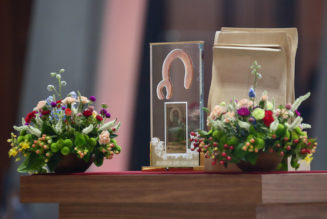, November 12, 2020

Jesus continues his discussion of living (and dying) well this Sunday, the 33rd Sunday in Ordinary Time. This week, it’s the Parable of the Talents.
Jesus asks us to imagine a wealthy man splitting his possessions among several managers while he is away on a long journey. Imagine taking that risk: He puts other people in charge of everything — his daily living, his preparation for the future, and his community and family responsibilities. If they blow it, he loses everything he owns and his whole life’s work.
It is frightening to imagine, especially when you realize it’s a true story, about us. Jesus ascended into heaven and left the whole project of his new covenant in our hands. We can cooperate with his plan or blow it.
That means we need to look very carefully at Sunday’s parable. We tend to focus only on the servant who gets one talent and fails — but it’s helpful to look at each.
True, the one with the least needs to work hard — but the one with many talents needs to work harder.
The one who received five talents in Jesus’ parable worked very hard. He received an enormous sum of money, if you consider that the equivalent of a talent weight of gold would be worth well over a million dollars today. Still, to make as much as he did with it, he had to have created quite an enterprise.
He couldn’t do that just through his natural aptitude or skill — the other definition of “talent.” Our personal talents don’t accomplish things without our effort. And that’s a hard lesson for the very talented to learn.
For instance, an economics professor at Benedictine College gives his senior students a demanding assignment each year. It involves almost daily work over several months compiling data and doing calculations. Students hate it while they do it, and greatly appreciate the experience when it’s done.
The professor told me that he has found that the most talented students often fail miserably at the project. Too often, they have gotten into the habit of coasting on their talents. They do good work effortlessly, so they never developed the habit of applying effort to their work. When they need to step up their efforts, the interior resources they need to do it aren’t there.
It can be the same for those who are naturally more pious. We have a “talent” for the faith life. We enjoy reading about it, discussing it and want to act on it. We get a lot out of prayer, we know our apologetics cold, and our conscience is well formed and alert.
The great temptation of “religious people” is to rely on our natural spiritual gifts, and not work to multiply them. We multiply them by reaching others through our example and our words, giving them what we have so that they reflect Jesus Christ in the ways we do, and more.
But the very talented are just as lazy and proud as the less talented; sometimes more so. Says Church Father Origen of Alexandria (184-253): “When you see one who has the power of teaching, and of benefiting souls, hiding this power, though he may have a certain religiousness of life, doubt not that such a one … hides [his talent] in the earth.”
Next are those with “medium-level” talents. They might follow Jesus better if they read Malcolm Gladwell.
Next, Jesus mentions the servant who received two talents.
In his book Outliers, the Story of Success, Gladwell gives examples of people who benefited from what he calls the 10,000 hours rule. They started out with some natural talent, but then put in an enormous amount of work — years spending hours on their craft — to become great. His examples include the Beatles playing more than 1,000 gigs in Hamburg, Germany, early in their career, and Bill Gates’ getting access to a 1968 computer at age 13 and spending daily hours programming on it.
Geoff Colvin in the book Talent is Overrated traces more such cases, pointing out that the quality of the practice is also important. “A study of figure skaters found that sub-elite skaters spent lots of time working on the jumps they could already do, while skaters at the highest levels spent more time on the jumps they couldn’t do,” he writes. “Landing on your butt twenty thousand times is where great performance comes from.”
It is the same with us. If we are just alright at loving God and neighbor, we need to do it more — a lot more — and in ways that challenge our comfort zone.
The less talented needn’t worry: God doesn’t expect us to do what we can’t. But he does expect us to work hard.
That brings us to Jesus’ final example, one that applies to who most of us are: The one-talent guy. But don’t think of having one talent as having next to nothing. Remember: a talent is worth more than a million dollars.
We are all millionaires in sacramental grace. The talent of baptism made us children of the Father, brothers to Jesus, and partners of the Holy Spirit. Confirmation ups the value, and Confession reboots it. The Eucharist gives us mystic-level union with Christ. If we’re married, our sacramental grace give us a bond so strong no government (and no cross) can break it.
St. Thérèse of Lisieux considered herself a “one-talent” Little Flower who had the sacraments and not much more. That is what we are. Do we bury those graces or put them to work like she did?
Putting our graces to work means honoring the Father, getting to know Jesus, and using the seven gifts of the Holy Spirit to be a Christian witness in the world. It means seeking the fruits of Holy Communion, living your marriage in Christ’s presence and letting confession transform you.
To get a good picture of what a successful “one talent” person looks like, see Sunday’s first reading about the ideal wife. There is nothing extraordinary in the description of what she is doing. Instead, it is a portrait of how noble a life is when someone does what they should.
The Second Reading is a great reminder of the stakes involved.
St. Paul reminds the Thessalonians, “the day of the Lord will come like a thief at night. … Therefore, let us not sleep as the rest do, but let us stay alert and sober.”
Jesus will come when we least expect it — at the hour death or at the end of time — and demand to see our talent count.
It will be no good to simply give him our talents back the way we got them. He will say “You wicked, lazy servant!” and ask, “Should you not then have put my money in the bank so that I could have got it back with interest on my return?”
The Church is the bank. If we do the minimum in our sacramental life — Sunday Mass, confession, daily prayer — and volunteer to do works of mercy through the parish or another organization, we will earn fine interest on our talent.
If not, we are living our life in darkness and we will live eternity in darkness too.
“Throw this useless servant into the darkness outside,” says the man in the parable, and Origen gives a chilling commentary on those words. The darkness of hell, he said has “no light, perhaps not even physical light; where God is not seen, but those who are condemned thereto are condemned as unworthy the contemplation of God.”
We all have the talents necessary to avoid that.
Tags: 33rd Sunday in Ordinary Time Year A, prayer, Sunday Gospel, Sunday Readings
Never miss a post! Subscribe below to our weekly newsletter.
Related
Join Our Telegram Group : Salvation & Prosperity







